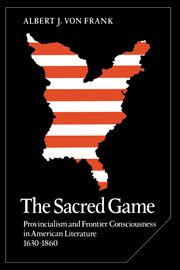Book contents
- Frontmatter
- Contents
- Dedication
- Preface
- Introduction: provincialism and the frontier
- 1 “But enmity this amity did break”
- 2 Brother Jonathan
- 3 “A musy in the thicket”
- 4 Geoffrey Crayon and the gigantic race
- 5 Hawthorne's provincial imagination
- 6 Working in Eden
- 7 Life as art in America
- 8 Reading God directly: the morbidity of culture
- Postscript: tradition and circumstance
- Notes
- Index
6 - Working in Eden
Published online by Cambridge University Press: 07 October 2011
- Frontmatter
- Contents
- Dedication
- Preface
- Introduction: provincialism and the frontier
- 1 “But enmity this amity did break”
- 2 Brother Jonathan
- 3 “A musy in the thicket”
- 4 Geoffrey Crayon and the gigantic race
- 5 Hawthorne's provincial imagination
- 6 Working in Eden
- 7 Life as art in America
- 8 Reading God directly: the morbidity of culture
- Postscript: tradition and circumstance
- Notes
- Index
Summary
I have heard, that from the beginning of her life, Margaret Fuller idealized herself as a sovereign. She told — she early saw herself to be intellectually superior to those around her, and that for years she dwelt upon the idea, until she believed that she was not her parents' child, but an European princess confided to their care. She remembered that, while a little girl, she was walking one day under the apple trees with such an air and step, that her father pointed her out to her sister, saying, Incedit regina.
– Ralph Waldo EmersonOne of the most obvious psychological burdens that artists in a frontier nation have to bear is the knowledge that the artifacts of culture, as well as a generous public concern for them, are primarily to be found elsewhere. Provincialism, in this sense, is the perception that real culture is exterior or foreign to one's place, and involves the corollary proposition that if one is to “have” culture at all, one must earn it personally and laboriously. Culture must, in the abstract, matter a great deal before serious effort will be expended to secure it. This may seem a truism today, but it has been an especially American truism with important, sometimes obscure implications for the artistic mind in America.
- Type
- Chapter
- Information
- The Sacred GameProvincialism and Frontier Consciousness in American Literature, 1630–1860, pp. 97 - 113Publisher: Cambridge University PressPrint publication year: 1985

